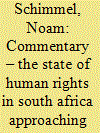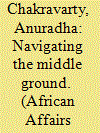|
|
|
Sort Order |
|
|
|
Items / Page
|
|
|
|
|
|
|
| Srl | Item |
| 1 |
ID:
193270


|
|
|
|
|
| Summary/Abstract |
As South Africa approaches 30 years of democracy, it is important to pause to reflect and analyze the trajectory of human rights since the fall of the apartheid regime and the advent of multiracial democracy. Although there was a large global movement against apartheid, this movement's vigilance for human rights in South Africa quickly declined and dissolved with the advent of South African democracy. There is little critical engagement with South Africa's contemporary human rights record and policies by global human rights activists, nongovernmental organizations, and civil society and still less active campaigning in defense of the human rights of South Africans, especially South Africa's most vulnerable and disadvantaged black majority. The energy that was summoned to protest apartheid and to boycott it never returned since the advent of democracy. This commentary explores the current state of human rights in South Africa, their prospects, and challenges to their respect, protection, and fulfillment.
|
|
|
|
|
|
|
|
|
|
|
|
|
|
|
|
| 2 |
ID:
110556


|
|
|
|
|
| Publication |
2011.
|
| Summary/Abstract |
Addressing historic injustice involves a struggle against absence. This article reflects on the foundations of that challenge, on absence and justice. I ask what it means to address the absent victims of deadly injustice given the distance of time and death that separates us from them. This topic embraces a wide swath of events of interest to students of politics. Some are as recent as the Rwandan genocide; others are by now historical: the Holocaust or slavery in antebellum America. All have in common that they and their victims are distant from us, a separation that makes doing them justice deeply perplexing. In response, I sketch an argument that the absent victims of injustice are not nullities but retain a status, a presence as claimants on justice that defines our efforts to address the wrongs done them.
|
|
|
|
|
|
|
|
|
|
|
|
|
|
|
|
| 3 |
ID:
133249


|
|
|
|
|
| Publication |
2014.
|
| Summary/Abstract |
Twenty years after the Rwandan genocide, little is known about the political values of non-elite Hutu. The post-genocide regime has emphasized the problem of "divisionism" and "genocide ideology", suggesting a popular preference for a radical stance on inter-group relations and reconciliation. This argument has been used to defer the question of democracy. This article investigates the attitudes of ordinary Hutu at a rural site, and shows that the respondents staked out a middle ground, emphasizing the shared interests of ordinary Hutu and Tutsi and distancing themselves from the political excesses of both Hutu and Tutsi elites. However, this moderate political space appeared to yield to more radical views when discussing the pressures of transitional justice, when respondents' careful distinction between elite and ordinary people collapsed and a monolithic actor, "the Tutsi", was imagined in conflict with "the Hutu". While this slippage appears to be a coping mechanism in the face of stressful situations rather than an inherent political preference, the article concludes that politically convenient assumptions and maladroit public policy risk contributing to the very dangers the regime claims to combat.
|
|
|
|
|
|
|
|
|
|
|
|
|
|
|
|
| 4 |
ID:
121597


|
|
|
|
|
| Publication |
2013.
|
| Summary/Abstract |
This article proposes the concept "extra-lethal violence" to focus analytic attention on the acts of physical, face-to-face violence that transgress shared norms about the proper treatment of persons and bodies. Examples of extra-lethal violence include forcing victims to dance and sing before killing them, souvenir-taking and mutilation. The main puzzle of extra-lethal violence is why it occurs at all given the time and effort it takes to enact such brutalities and the potential repercussions perpetrators risk by doing so. Current approaches cannot account for this puzzle because extra-lethal violence seems to follow a different logic from strategic calculation. To investigate one alternative logic-the logic of display-the article proposes a performative analytic framework. A performative lens focuses attention on the process by which actors stage violence for graphic effect. It highlights the range of roles, participants, and activities that contribute to the production process as a whole. To demonstrate the value of a performative approach, the article applies this framework to three very different extra-lethal episodes: the massacre at My Lai during the Vietnam War, the rape and killing of two women during the Rwandan genocide, and a lynching that took place in rural Maryland. The article concludes by sketching a typology of performance processes and by considering the policy implications of this type of theorizing and knowledge.
|
|
|
|
|
|
|
|
|
|
|
|
|
|
|
|
|
|
|
|
|